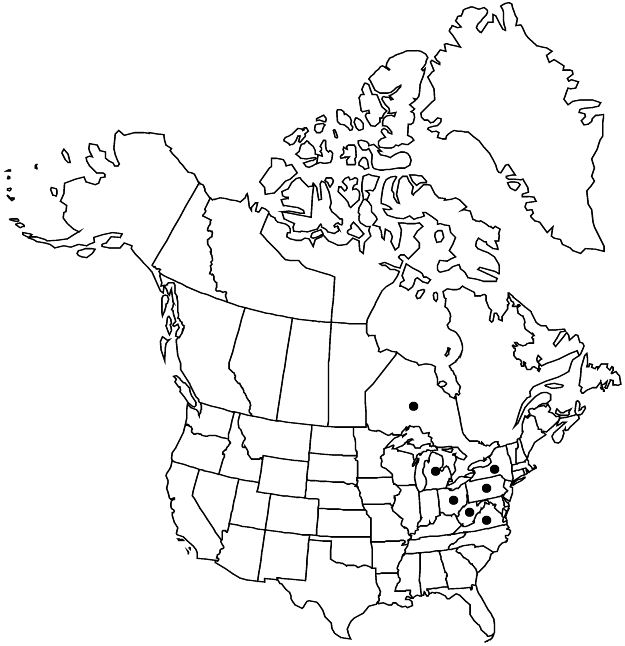Difference between revisions of "Crataegus compacta"
Crataegus S. Michigan, 522. 1907.
FNA>Volume Importer |
FNA>Volume Importer |
(No difference)
| |
Revision as of 23:14, 16 December 2019
Shrubs, erect, 60 dm. Stems: twigs: new growth reddish green, 1-year old tan, 2-years old dull gray; thorns on twigs ± numerous, ± straight to slightly recurved, 2-years old shiny blackish, medium thickness, 1.5–3 cm. Leaves: petiole length 50–75% blade, sparsely glandular; blade trullate to rhombic-ovate, 3–5 cm, thin, base cuneate, lobes 2 or 3 per side, sinuses shallow, lobe apex subacute, margins serrate, teeth 1 mm, veins 4 or 5 per side, apex acute, surfaces glabrous, sometimes adaxial sparsely hairy young. Inflorescences 4–7-flowered; branches glabrous, sparsely punctate; bracteoles sometimes greenish, large, margins short-stipitate-glandular. Flowers 15–18 mm diam.; sepals narrowly triangular, 4–5 mm, margins subentire, abaxial pubescence not recorded; stamens 20, anthers pink to red, 0.3 mm; styles 3 or 4. Pomes usually borne singly, greenish to pinkish or pale purple, or dull reddish purple, 8–11 mm diam., moderately pruinose (sometimes bracteolate); sepals on collar, spreading, sometimes erose; pyrenes 2 or 3. 2n = 34, 51, 68.
Phenology: Flowering May; fruiting Sep–Oct.
Habitat: Scrub, woodland edges, pastures, fencerows
Elevation: 100–300 m
Distribution

Ont., Mich., N.Y., Ohio, Pa., Va., W.Va.
Discussion
Crataegus compacta is common in the Carolinian zone of Ontario and extends to Michigan, New York, and Pennsylvania (where infrequent), and to the Virginia Blue Ridge (reported for Ohio by Palmer).
Crataegus compacta is most similar to C. gattingeri, one of the two most widespread species in the series, but the allopatry of the two, as well as consistent differences in leaf shape, underlines their distinction. The pedicels and hypanthia in young flowers are conspicuously reddish. Similar forms from Pennsylvania, though with ivory anthers, are C. repentina Sargent with 10–20 stamens and minute anthers, and C. varians Sargent with 10–15 stamens.
Selected References
None.